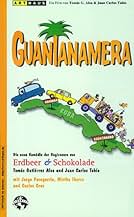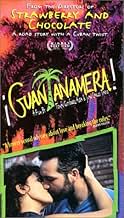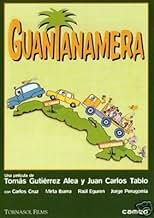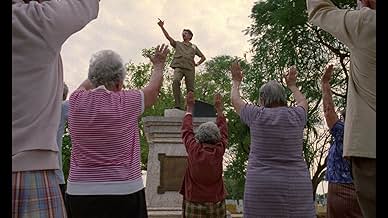Guantanamera
- 1995
- Tous publics
- 1h 45min
NOTE IMDb
6,9/10
1,6 k
MA NOTE
Film satirique sur la vie à Cuba. Les membres d'un cortège funèbre et des chauffeurs de camion se mettent à discuter de Dieu et du monde, découvrant combien leurs vies sont à la fois différe... Tout lireFilm satirique sur la vie à Cuba. Les membres d'un cortège funèbre et des chauffeurs de camion se mettent à discuter de Dieu et du monde, découvrant combien leurs vies sont à la fois différentes et similaires.Film satirique sur la vie à Cuba. Les membres d'un cortège funèbre et des chauffeurs de camion se mettent à discuter de Dieu et du monde, découvrant combien leurs vies sont à la fois différentes et similaires.
- Réalisation
- Scénario
- Casting principal
- Récompenses
- 7 victoires et 1 nomination au total
Luisa Pérez-Nieto
- Marilis
- (as Louisa Pérez Nieto)
José Ángel Espinosa 'Ferrusquilla'
- Justo
- (as Jose Antonio Espinosa)
Rubén Breña
- Rivero
- (as Rubén Breñas)
Avis à la une
A small look at life in Cuba, "Guantanamera" portrays a world-famous Cuban singer returning to her hometown and suddenly dying. Her funeral procession reveals several things about the people involved, namely the love-starved existence of a woman sick of her creepy husband.
Obviously, we in the United States only get to hear about Cuba occasionally, so at the very least this movie should provide some insight into the state of affairs there (or just to hear the Cuban dialect, with its dropping of esses). But anything looking at people's individuals lives and how policies have affected them gets praise from me. We see how people have to abide by food rationing, among other things (of course, this is mainly due to the US blockade against the island). So I recommend this film.
Obviously, we in the United States only get to hear about Cuba occasionally, so at the very least this movie should provide some insight into the state of affairs there (or just to hear the Cuban dialect, with its dropping of esses). But anything looking at people's individuals lives and how policies have affected them gets praise from me. We see how people have to abide by food rationing, among other things (of course, this is mainly due to the US blockade against the island). So I recommend this film.
Guantanamera, a Cuban light drama by accomplished director Tomas Gutierrez Alea (1928-1996), is a tropical road movie. The setting is the 1990s, following withdrawal of USSR support for its little-brother Communist regime. A woman dies, some distance removed from Havana, and the goal is to transport her to the capital for burial. A tiny entourage of family accompanies the hearse.
Some snippets, though not central to the plot: How do government-run funeral homes work exactly, in a Communist country? Well, first, there is a per-person quota of refreshments for the bereaved and acquaintances who are paying last respects. But doesn't this attract inauthentic freeloaders? Second, there is a scene involving a meeting of regional mortuary-manager bureaucrats. If travel expenses for hearse trips are allocated according to the relative mileage of the territories through which vehicles traipse, the funeral home functionary in a crossroads region takes more than her share of budgetary hits. Is that fair? Third, there is the question of why the burial in Havana in the first place. If everybody and everywhere in Cuba are socialistically equal, what's wrong with the deceased staying put where she was? Meanwhile, we also have organized hitchhiking. Officials have the power to commandeer vacant seats from those who have for those who need.
There is some Latino romance, and some lightly subversive free enterprise. All in all, a likable movie. Mirta Ibarra, who starred twelve years earlier in Alea's 1983 film, Up To a Certain Point, gets an encore. She plays the niece of the deceased, who is also the wife of the over-serious Daniel Ortega-looking official who's in charge of the expedition.
Some snippets, though not central to the plot: How do government-run funeral homes work exactly, in a Communist country? Well, first, there is a per-person quota of refreshments for the bereaved and acquaintances who are paying last respects. But doesn't this attract inauthentic freeloaders? Second, there is a scene involving a meeting of regional mortuary-manager bureaucrats. If travel expenses for hearse trips are allocated according to the relative mileage of the territories through which vehicles traipse, the funeral home functionary in a crossroads region takes more than her share of budgetary hits. Is that fair? Third, there is the question of why the burial in Havana in the first place. If everybody and everywhere in Cuba are socialistically equal, what's wrong with the deceased staying put where she was? Meanwhile, we also have organized hitchhiking. Officials have the power to commandeer vacant seats from those who have for those who need.
There is some Latino romance, and some lightly subversive free enterprise. All in all, a likable movie. Mirta Ibarra, who starred twelve years earlier in Alea's 1983 film, Up To a Certain Point, gets an encore. She plays the niece of the deceased, who is also the wife of the over-serious Daniel Ortega-looking official who's in charge of the expedition.
As pure entertainment, the film does seem scattered and unfocused. However, it packs in many social, political and cultural messages on different levels. For instance, as the characters enter Bayamo, we hear a tour guide telling of Bayamo as historical center for smuggling and how this motivated rebellious action against colonial Spain. I took this as a commentary about present-day Cuba. The film is filled with metaphors, starting, of course, with the plot: a former economics teacher falls in love with a trucker and leaves her crass, heartless, bureaucrat husband. To really enjoy this movie, you have to understand that it is a report on the state of the country, and the characters and plot serve to veil documentary as movie fiction. Knowledge about recent Cuban history certainly helps understanding the movie, though, and you may want to see other films or read about present-day Cuba first.
Guantanamera is a movie that encompasses the genre of a road movie and love story. Gina's Aunt Yoyita from Havana, who was once a famous performer, is in Guantanamera to receive an award. During the award ceremony, she notices her long lost love from 50 years ago, Candido. The relationship rekindles and the two are in love once again. When Yoyita suddenly dies, her body needs to be transported back to Havana. Gina's husband Adolfo, who is an undertaker for the state, takes charge of everything and arranges Yoyita's long complicated journey home. Adolfo is an arrogant abuser who has no respect for his wife. At one point he visualizes himself on top of a statue, as the leader. Accompanied by a driver, Adolfo, Gina, and Candido make the long complicated journey to Havana transporting Yoyita from vehicle to vehicle implementing Adolfo's new money saving plan. During the journey, Gina encounters one of her prior students, a womanizing trucker named Mariano, who has longed for Gina since she was his teacher. The two find themselves running into each other at different points along the way. Is Adolfo worthy of Gina's love, or does Mariano finally win his long lost teacher? The director makes it a point for the camera to show us the lush tropical background of Cuba, as well as the poor, dirty, poverty stricken areas displaying billboards with political messages indicating corruption. During the journey, Mariano and Ramon are seen picking up hitchhikers delivering them, as well as, the product on the bed of the truck. The roads are unpaved and dirty showing the economic hardship of the region. Favors are done in exchange for monetary reward, evidence of economic corruption. The film techniques used are similar to those used in Hollywood. They include the use of brightly lit scenes, with most being filmed outside, using natural daylight. The cinematography was mostly at eye level with a motion picture camera,showing steady, smooth scenes. The film was slow paced but kept my attention.
The movie seems ambitious in its elements - a satire of bureaucratic Cuba (via the red tape associated with cross-country funeral delivery arrangements), frequent broad comedy (mainly in the truck driver's entanglements with his various women), much romantic wistfulness as the old man deals with a life largely wasted through lack of courage and Gina realizes the aridity of her marriage to Alonzo, within which her own creativity is stifled; the economic and cultural diversity of Cuba sketched in bits and pieces along the way. As executed, the overall framework for all of this - that of a loosely structured road movie - sets the tone more fully than might have been advisable: the rhythm reflects the leisurely procession along the road and the jauntily resigned renditions of the title song, which makes for good but not very provocative entertainment. The film seems to look back more than forward, with a pervasive sense of quiet nostalgia and regret about it, although there's also a gentle postivism that things can be overcome (with no thanks to the political infrastructure, it subtly suggests).
Le saviez-vous
- AnecdotesFinal film directed by Tomás Gutiérrez Alea.
- ConnexionsReferenced in Last Night (1998)
Meilleurs choix
Connectez-vous pour évaluer et suivre la liste de favoris afin de recevoir des recommandations personnalisées
- How long is Guantanamera?Alimenté par Alexa
Détails
Box-office
- Montant brut aux États-Unis et au Canada
- 903 840 $US
- Week-end de sortie aux États-Unis et au Canada
- 8 851 $US
- 6 juil. 1997
- Montant brut mondial
- 903 840 $US
Contribuer à cette page
Suggérer une modification ou ajouter du contenu manquant























